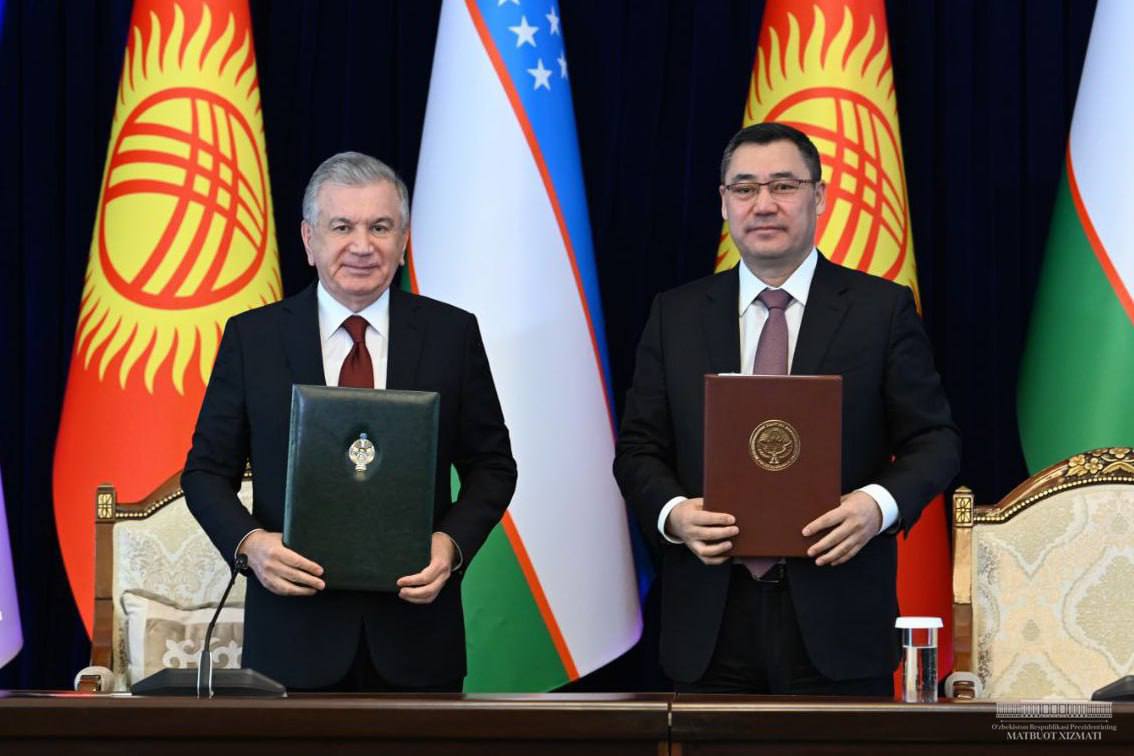Kyrgyz President Sadyr Japarov made a state visit to Uzbekistan on July 18-19. President Mirziyoyev, along with the First Lady of Uzbekistan, personally greeted President Japarov at the airport. During high-level meetings, they discussed a broad spectrum of bilateral cooperation issues, ranging from trade and regional security to cultural and humanitarian exchanges. As a result, 16 bilateral documents were signed.

Uzbek-Kyrgyz relations are continually evolving. Since taking office, President Mirziyoyev has collaborated with four Kyrgyz presidents—Almazbek Atambayev (2011-2017), Sooronbay Jeenbekov (2017-2020), Talant Mamytov (2020-2021), and Sadyr Japarov (2020-present)—achieving varying outcomes. Although a treaty of eternal friendship was signed between Presidents Askar Akaev of Kyrgyzstan and Islam Karimov of Uzbekistan, their vision never transformed into tangible outcomes. Past border tensions and ethnic clashes—in 2010, 2013, and 2016—led to deteriorating relations characterized by a lack of dialogue and diplomacy. Unlike his predecessor, President Mirziyoyev, who embraces regionalism, has achieved noteworthy outcomes in recent years regarding border disputes with neighboring countries. A new point of departure in deepening Uzbek-Kyrgyz relations arose from the settlement of the demarcation issue with the ratification of the “Agreement on Certain Sections of the Kyrgyz-Uzbek Border” and the “Agreement on Joint Management of Water Resources of the Kempir-Abad (Andijan) Reservoir” in 2022. Commitments from both governments paved the way for further development of relations and contributed to regional stability and security, aiming to restore credibility toward a vision of “eternal friendship.”
Since 2016, President Mirziyoyev has made seven trips to Bishkek in various formats, including one state visit and two working visits in 2023 alone. President Japarov has also visited Uzbekistan in 2021, 2022, 2023, and now in 2024. These visits, whether at the state level or for working purposes, underscore the close cooperation in Central Asia.
As of January-May 2024, Uzbekistan’s trade turnover with Kyrgyzstan stood at about $294mn. In 2023, Presidents Mirziyoyev and Japarov signed a “Program of Strategic Trade and Economic Partnership for 2023-2025,” along with agreements for close cooperation in energy, agriculture, and key industries. Enterprises with Uzbek and Kyrgyz capital are increasing, constituting 70 and 273 enterprises in Kyrgyzstan and Uzbekistan, respectively. During the current visit, both countries agreed to create conditions to increase the trade volume to $2bn in the near future under the framework of the “Action Plan for Increasing the Volume of Mutual Trade in 2024-2030.” Main areas of cooperation remain the agro-industrial, industrial, transport, and tourism sectors. The Uzbek-Kyrgyz Development Fund prioritizes financing mutually beneficial investment projects in these sectors, with industrial cooperation already reaching $300mn. To further promote projects, it was agreed to increase the authorized capital of the Uzbekistan-Kyrgyz Fund to $200mn.
In their 2024 analysis titled “Directions of Trade Relations of Uzbekistan with the Countries of Central Asia,” scholars Vokhidova and Abdullayeva analyzed the trade turnover of Uzbekistan with Central Asian countries based on data from 2000-2021. They identified that Uzbekistan faces challenges related to WTO membership and the need for production modernization. Notably, one of the key agreements from the current visit is the “WTO Membership Protocol,” marking another step towards Uzbekistan’s integration into the global trading system. The bilateral documents signed during the visit largely resembled previous agreements in content and character, with occasional provisions aimed at enhancing cooperation in education, science, tourism, and culture.
This year, China, Kyrgyzstan, and Uzbekistan signed an agreement on a long-planned railway project under the Belt and Road Initiative (BRI). The CKU project is strategically important as it significantly shortens the trade route between China and Europe. Given that both countries are landlocked, the completion of the CKU project would provide Uzbekistan and Kyrgyzstan with vital access to the major markets of South Asia and the Middle East. Since China is the largest trading partner of both Uzbekistan and Kyrgyzstan, the direct land route is expected to facilitate trade and economic exchanges by reducing costs and transit times. Essentially, the project represents a potential economic diversification opportunity due to increased access to international markets, which could reduce the countries’ dependence on traditional trade routes.
Economic diversification offers two primary benefits: a positive correlation between economic growth and diversification, reallocating labor to capital-intensive activities, thereby establishing new industries or broadening existing sectors; and diminishing a country’s susceptibility to external shocks and policy alterations in trading partners.
Materializing this vision necessitates friendly and stable relations achieved through continuous diplomatic engagements and dialogues. The commitment of both Uzbekistan and Kyrgyzstan to the project signifies entering a new phase of strategic deepening of economic ties and cooperation between China and Central Asia. President Mirziyoyev stated, “... the signing of the tripartite agreement on the strategic project of the construction of the China-Kyrgyzstan-Uzbekistan railway was a historic event.”
Recent political developments in Uzbekistan and Kyrgyzstan, coupled with the emerging world order, indicate that both countries will neither remain neutral nor rely solely on a single neighboring power but will pursue multi-vector diplomacy. Regional peace and stability can be strengthened through the active engagement of Uzbek and Kyrgyz governments with the global community, addressing economic and security problems in the region. Both Presidents Mirziyoyev and Japarov emphasized the essential nature of deepening and expanding Kyrgyz-Uzbek relations, recognizing it as a necessity rather than a choice.
By: Sardor Allayarov
Allayarov is an International Relations specialist, a Visiting Research Fellow at Lanzhou Jiaotong University, the People's Republic of China and an Adjunct Faculty at Urgench State University, Uzbekistan.
Comments (0)